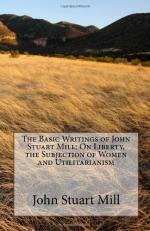
|
| Name: _________________________ | Period: ___________________ |
This test consists of 15 multiple choice questions and 5 short answer questions.
Multiple Choice Questions
1. What does the author imply that exist to make the best of the citizenry?
(a) Various social policies.
(b) Organizations.
(c) Programs.
(d) Schools.
2. What does Mill believe is under attack?
(a) Freedom and variety of situations.
(b) Life and liberty.
(c) Discipline and control.
(d) Love and empathy.
3. What is one example that he cites regarding persecution?
(a) The closing of businesses for a national holiday.
(b) Complaints by school children for having to attend school during bad weather.
(c) Fierce objections against museums being open on the Sabbath.
(d) Objections to having late business hours during the week.
4. To what does he refer regarding persecution?
(a) The persecution of his family.
(b) The suffering of the persecuted.
(c) His own and others' reactions to persecute others as he is to the problem of people struggling to survive persecution.
(d) What he has suffered because of persecution.
5. Between what does the author differentiate?
(a) What is an opinion and what is a fact.
(b) Opinions that are factual and should be expressed and those that are false.
(c) Specific locations and situations in which one may express his or her opinion.
(d) The legitimate use of free speech and the acts of instigation and provocation.
6. What has an adverse effect upon separation?
(a) Improved communications and other systems that 'break down distance.'
(b) A need for differentiation.
(c) The desire to have similar belief systems.
(d) Weakened communications.
7. From what century is Wilhelm Von Humboldt?
(a) The 16th century.
(b) The 19th century.
(c) The 17th century.
(d) The 18th century.
8. Regarding the previous question, does Mill believe that this is ideal?
(a) Maybe.
(b) Yes.
(c) Sometimes.
(d) No.
9. What religious sect does he address now?
(a) The Baptists.
(b) The Church of the Brethren.
(c) The Seventh Day Adventists.
(d) The Mormons.
10. What the author implies exists are often directed to whom?
(a) The well educated.
(b) The intelligent.
(c) The poor.
(d) The wealthy.
11. What does the author believe members of society need to have nurtured?
(a) The education.
(b) Their physical capabilties.
(c) Their mental capabilities and other attributes.
(d) Their interests.
12. What does Mill believe had a hand in dealing with those who are undisciplined?
(a) The gangs.
(b) The military.
(c) Religion.
(d) The political parties.
13. What does the author believe regarding medicines?
(a) Under certain circumstances they may be warranted.
(b) They are useless.
(c) They should never be used.
(d) They are very dangerous.
14. According to the author, what is persecution?
(a) A reaction of people to others.
(b) When an individual or a group emotionally or physically abuses another.
(c) When one person does not like another person.
(d) When an individual or group physicalls assaults another.
15. Who has provided a grand support of Mill's statement regarding variety of situation?
(a) The Germans.
(b) The Chinese.
(c) The French.
(d) The Spanish.
Short Answer Questions
1. Do Unitarians face persecution in Mill's society?
2. How does one begin to persecute another?
3. Can the interference and control of the individual by the state or nation be the preferred course of action?
4. When should drugs be used?
5. What exists today that the author did not mention?
|
This section contains 554 words (approx. 2 pages at 300 words per page) |

|




